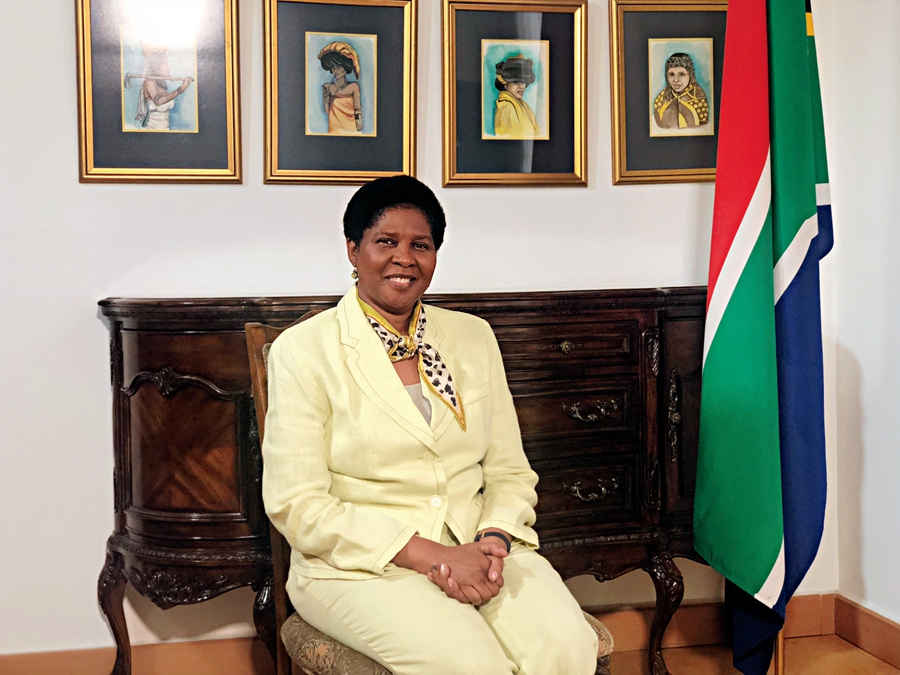MARKING the 20th anniversary of diplomatic relations between China and South Africa, 2018 is a fruitful year for high-level bilateral exchanges and pragmatic cooperation. The two heads of state first met at the 10th BRICS Summit in Johannesburg in late July, and will soon gather at the Beijing Summit of the Forum on China-Africa Cooperation (FOCAC) together with leaders from other African countries in early September.
Fruitful Cooperation
President Xi Jinping’s state visit to South Africa on July 24, 2018, a day prior to the 10th BRICS Summit which took place from July 25 to 27 in Johannesburg, was a great success. During the state visit, the two sides discussed measures to strengthen bilateral trade, investment, and commercial relations, and increase and diversify South African exports to China, as well as ways to promote foreign direct investment by Chinese companies in South Africa. The two countries also reached consensus on enhancing cooperation at international forums, especially within the context of BRICS, FOCAC, and the United Nations Security Council. A total of 14 agreements and MoUs involving US $14 billion were signed during the state visit.

Dolana Msimang, South African Ambassador to China.
On the investment front, President Ramaphosa suggested China to lead the flow of international investors when South Africa hosts the Investment Conference in October 2018, which aims to generate at least US $100 billion in new investments in South Africa over the next five years. On the other hand, South Africa will participate in the China International Import Expo scheduled to take place in November in Shanghai.
The bilateral trade volume has noticeably increased over the past several years. However, most of the exports from South Africa are raw materials. Therefore, the two presidents agreed that South Africa and China would place more emphasis on the importance of facilitating investment with regard to greater value-addition, and identify new areas of market opportunities in China.
China-South Africa relations are showing great momentum. However, they also need to be further strengthened through high-level exchanges so as to deepen mutual political trust. The two sides should support each other in independently choosing the development path that suits their own national conditions. There is a need to continue to understand and support each other on issues involving respective core interests and major concerns, increase exchanges between the governments, legislative bodies, various other areas, and deepen the inter-party exchanges and cooperation.
People-to-people bonds can be deepened by implementing the consensus the two sides have reached on facilitating personnel exchanges, and strengthening cultural and educational exchanges. They should also consolidate cooperation in human resources development and tourism.
Moreover, the two sides need to increase coordination within multilateral frameworks including the UN, G20, and the BRICS, jointly safeguard multilateralism, oppose unilateralism and protectionism, and promote a more just and equitable international order.
Promising Prospects
At the FOCAC Beijing Summit, all sides were full of expectations. Heads of state from China and African countries talked about how to align the Belt and Road Initiative (BRI) with the national strategies of African countries and the 2063 Agenda of the African Union. The Belt and Road Initiative, regarded as being by far the most significant and far-reaching project China has ever embarked on, is promising more opportunities to African countries. The need for connective infrastructure in Africa is evident. Without roads to transport construction equipment or electricity to power manufacturing factories, contractors’ projects, which originally had big hopes, often do not materialize.

Local students exercise tai ji with their Chinese teacher at the Confucius Institute of the University of Johannesburg on July 24, 2018.
The BRI offers an opportunity to deepen Sino-African relations and should be explored further by the leadership of both China and Africa. The BRI dovetails with Africa’s own Agenda 2063, an initiative designed to fast track the implementation of solutions on critical development issues, such as poverty, unemployment, and inequality.
It is a fact that China is a country with excessive savings and infrastructure capacity whereas the African continent in aggregate relatively lacks both. In this regard, the BRI represents an agenda that broadly seeks to take “win-win” advantage of that complementarity.
The successful implementation of the BRI throughout the African continent will have the added effect of improving intra Africa trade. Currently standing at about 10-15 percent, trade among African countries is the lowest compared to all the other continents (North America has 40 percent while Europe has 60 percent intra-regional trade). The multiplier effect this has would definitely propel Africa onto the growth path. Throughout Africa, Chinese companies are building vital infrastructure; including dams, ports, and roads, and helping to renovate government offices and other buildings.
Facilitated by the FOCAC mechanism, significant progress has been made in cooperation programs between China and African countries in areas such as agriculture modernization, public health, facilitation of trade and investment, people’s livelihood, as well as industrialization and infrastructure. China provided US $60 billion in funding of various kinds to African countries under the banner of FOCAC. This gave full effect to the realization of inclusive and sustainable development in Africa’s economy and society. So far, economic and trade initiatives have been gradually implemented, which effectively bring about new developments in practical cooperation between China and Africa.
China-African cooperation plans have not only promoted the improvement of economic and social development in Africa and the level of people’s living standards, but have also led to stable and healthy development of China-Africa economic and trade relations. In 2017, China-African trade volume reached US $170 billion, up 14 percent over 2016.
China has maintained its position as Africa’s largest trading partner for the past nine consecutive years. China’s direct investment flow in Africa reached US $3.1 billion in 2017. The investment structure has been continuously optimized and the quality of investment has steadily improved.
We believe that at the FOCAC Beijing Summit, relations between Africa and China will be further strengthened and solidified.
DOLANA MSIMANG is South African Ambassador to China.